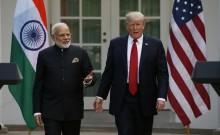China is planning to send 1000 metric tonnes of petrol to Nepal in the next few days with the Madhesi agitation and blockade hitting the fuel supply to the landlocked Himalayan nation, according to a report in the Indian Express.
Supplies from India to Nepal have been blockaded for five weeks because of the Madhesi agitation and the Indian government had asked Indian truckers not to enter Nepal for fear of violence. The Madhesi stir has vitiated relations between India and Nepal and led to an acute shortage of petroleum products in Nepal.
The Madhesi agitation has also led to rising anti-India sentiments in Nepal which Prime Minister Narendra Modi had visited in November 2014. He had posited closer relations with Nepal and sought to help the nation when it was struck by a devastating earthquake in April last. However, ties have deteriorated since then.
According to the Indian Express report, Nepalese Prime Minister K P Oli had a meeting with Chinese ambassador Wu Chuntai on Friday with a request to supply fuel. "Initially China will be providing 1,000 metric tonnes of petrol soon, and then terms and conditions would be worked out," sources said.
India continues to supply essential commodities and medicines across some other entry points to Nepal other than the Raxaul border crossing. But this blockaded crossing is the one that accounts for the biggest volume of export to Kathmandu.
On Saturday, supporters of Madhesi parties turned violent and attacked buses and other vehicles being escorted by security forces in southern Nepal near the Indian border. Many were injured in the clashes that took place thereafter between security forces and Joint Democratic Madhesi Front (JDMF) cadres.
Police fired around 30 rounds into the air to control the protesters and several bus passengers were injured in pelting of stones, ibnlive.com reported. Over 40 people have died in the agitation so far which was triggered after the adoption of the new constitution on September 20.
Madhesi parties - who claim to represent the interests of the Indian-origin inhabitants of Nepal's Terai region - and Tharu ethnic groups are against the new Constitution which they say discriminates against them.

















